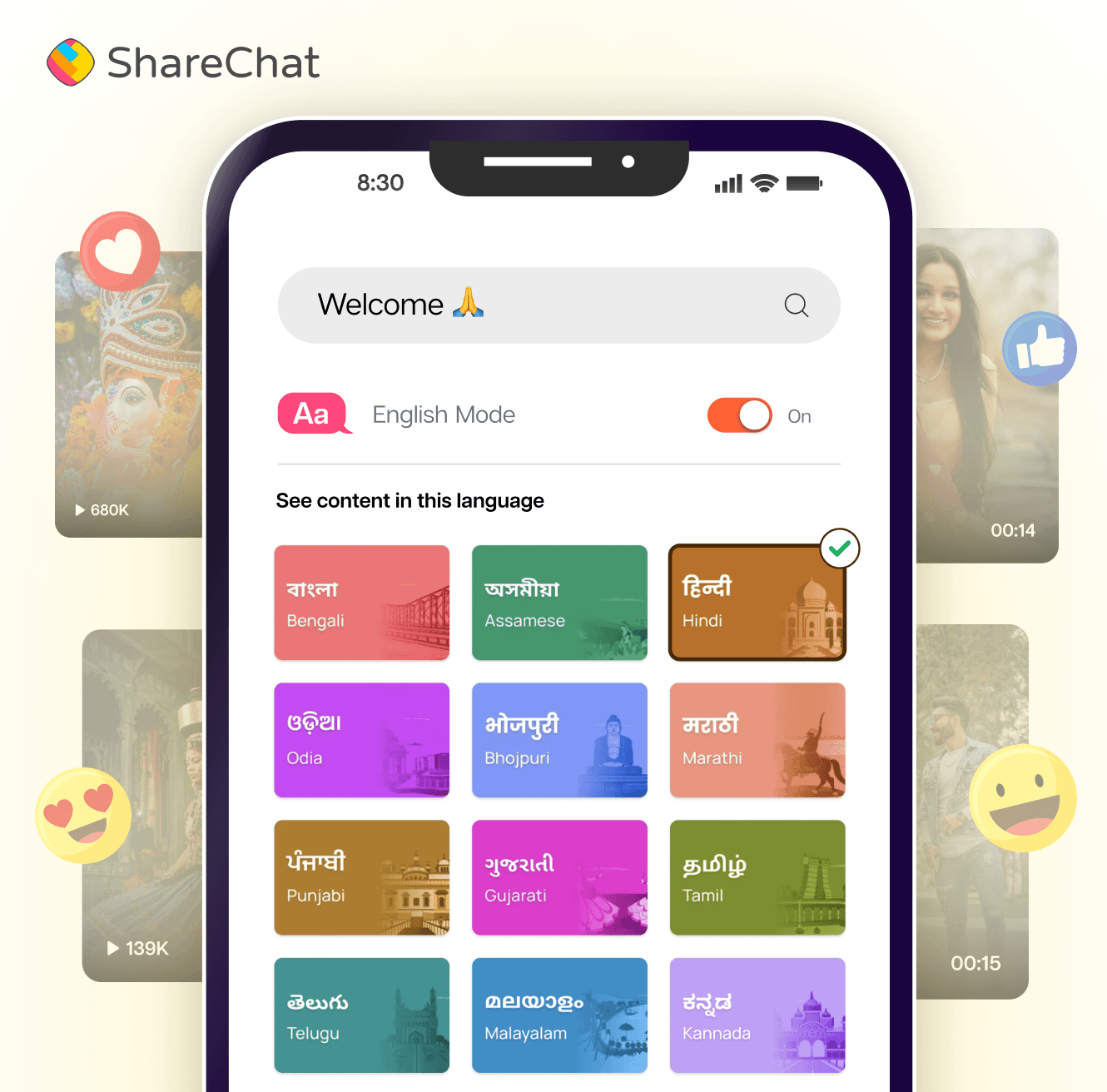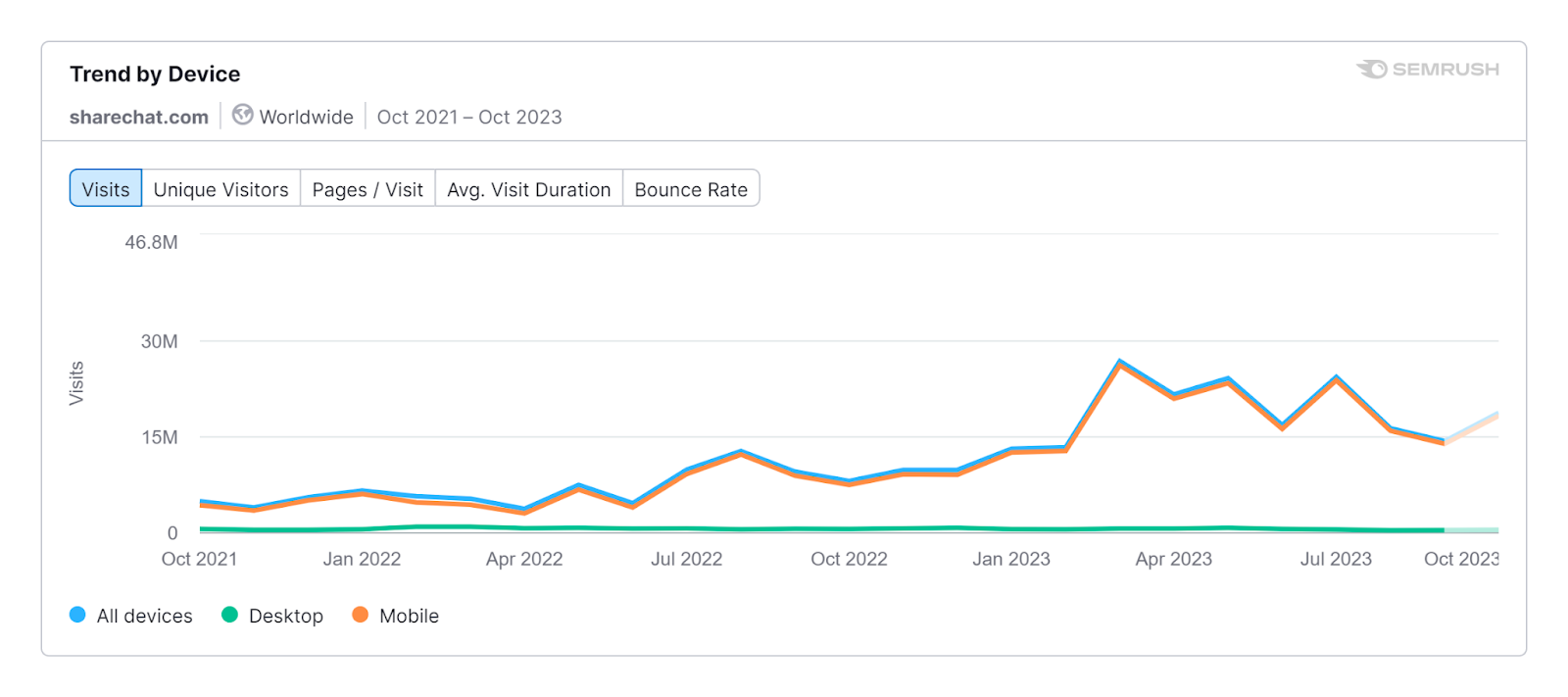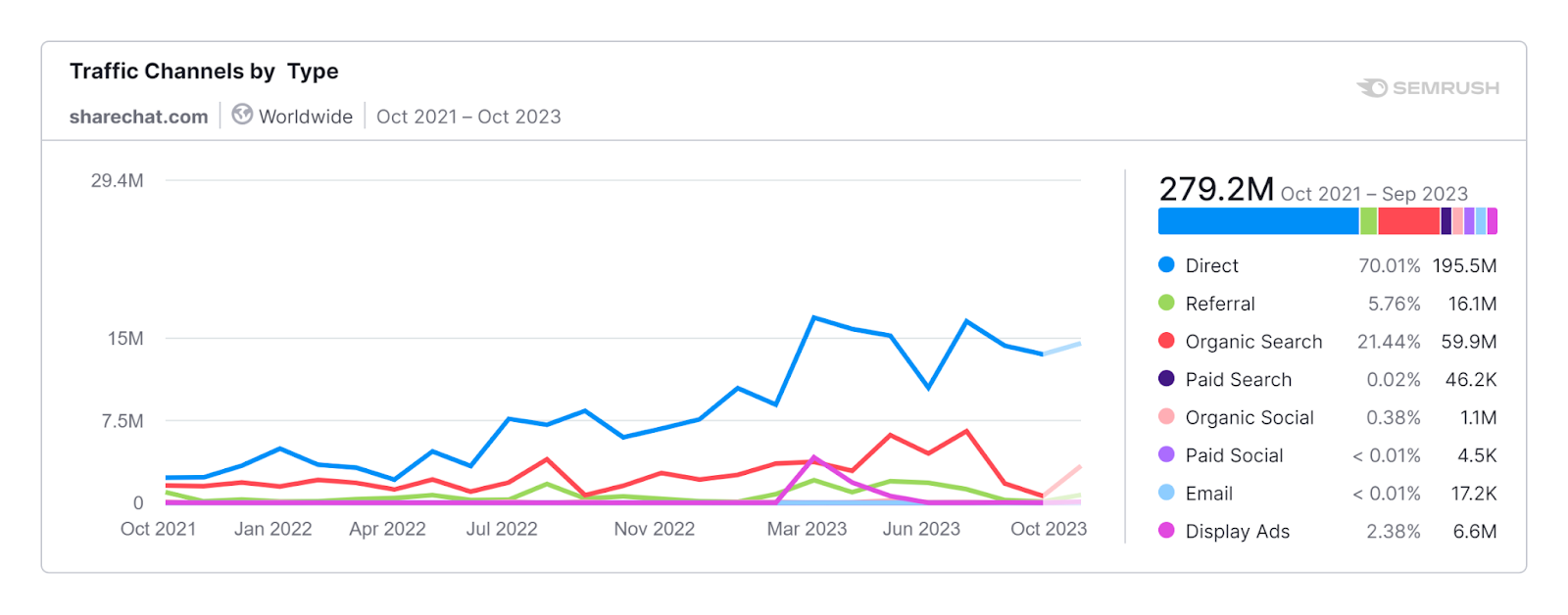How ShareChat leveraged Pepper Content to become India's largest multilingual social media platform
ShareChat is a prominent social media platform that caters to India's diverse linguistic landscape. This case study examines the factors that contributed to ShareChat's emergence as India's largest multilingual social media channel. It explores the company's inception, strategic decisions, user engagement initiatives, and response to challenges that enabled it to attain its dominant position in the Indian social media market.

Industry
Social Network Service Platform
Country
India
Company Type
Enterprise
In this story
IntroductionThe logic for an app like ShareChatThe idea for ShareChatHow did ShareChat reach its present position?The challenges and growth opportunities for ShareChat5 Strategy Pillars adoptedHow was the strategy put into action?What metrics does ShareChat use to evaluate success?ConclusionWhen I think of confidence, I go to Pepper. I know there are other players in the market, and I know there are tools and all of that, but when I reached out to Pepper and told them about the challenges and requirements, they were confident and accommodating. That's something I always loved about Pepper.

The Tower of Babel should have been placed in India. India has over 22 officially recognized languages written in about 13 different scripts and spoken in hundreds of regional dialects. A person from one area may speak a slightly different dialect from another one a few miles away. But the interpretation could be totally different, leading to misunderstandings, lack of comprehension, and avoidable confusion. So, yes, language does play an important role in shaping communication and expression.
Top Spoken Languages in India
There is also a significant sub-section of people in India who speak English. Most of these reside in urban areas but a growing number can be found in rural areas. But it should be noted that those who speak English usually prefer to speak in their native language with their friends and families.
Although there is a significant gap between English speakers in “urban” and “rural” India, the internet revolution in India has upended this difference. There are more internet users in rural India (399 million) than in urban India (360 million). The total number of users is growing and is expected to reach almost 90% of the population soon.
The growth of the internet led to the growth of “social media” which allowed people to get in touch with far-flung friends and family members through various apps such as Facebook, Instagram, and Twitter (now “X”). However, the mode of communication in all these platforms is English. This led to a big number of non-English speaking internet users in India not being able to use these apps to connect with their loved ones.
ShareChat was founded in 2015 by IIT-Kanpur alumna Ankush Sachdeva, Bhanu Singh, and Farid Ahsan with a vision to provide a platform that embraces India's linguistic diversity. With over 1.3 billion people speaking more than 22 languages, the founders saw an opportunity to create a social media platform that could cater to regional users.
Currently, ShareChat is India’s leading multilingual social media platform. It is owned by Mohalla Tech Pvt Ltd, based in Bangalore. With its diverse user base, ShareChat boasts over 300 million monthly active users who engage in content across 15 different Indian languages.
The company is currently valued at an impressive $5 billion, reflecting its significant impact and potential in the market.

The founders took several strategic decisions to drive ShareChat's position as India's largest multilingual social media channel including:
Understanding the Linguistic Diversity of India
ShareChat recognized the vast linguistic diversity of India
It offers content in multiple regional languages, including Hindi, Tamil, Bengali, Telugu, Marathi, Kannada, Gujarati, and more
Hyper-Local Content Curation
ShareChat adopted a hyper-local content curation strategy
This ensured that users received content that was relevant and relatable to their specific regions and cultures
This in turn encouraged users to engage actively with the platform and share content with their networks
User-Generated Content (UGC) Growth
ShareChat's success can be attributed to its emphasis on user-generated content
The platform encourages users to create and share content in their native languages
Inclusivity and Accessibility
ShareChat aimed to be accessible to users from all walks of life
This included users with limited access to smartphones or data connectivity
ShareChat needed to grow its market, remain relevant to its users, and retain its position as a path-breaking social media platform.
Primary objective
Cater to the content needs of tier two, three, and four cities across 15 Indian languages; become India’s largest multilingual social media platform.
How did it work on this challenge?
ShareChat first worked out a broad SWOT to understand its key challenge(s):
The SWOT surfaced a clear challenge: How to engage choose the most relevant languages and segment them as per the cultures and backgrounds of their users.
ShareChat developed 5 “strategy pillars” to drive its growth:
Assessment of background and persona creation:
People who communicate in a particular mother tongue come from diverse cultural backgrounds
This creates a language diversity that needs to be smoothened to a common point
This common point is a language or dialect that all users of that language or dialect understand
For this, ShareChat created a playbook covering different personas
Multilingual Interface:
ShareChat developed a UI supporting multiple languages
This helped users feel more comfortable and engaged on the platform
Regional Content Curation:
ShareChat curated and promoted content in different regional languages to cater to different language preferences
The content included videos, articles, and posts in most languages
Localization:
ShareChat went beyond mere translation – it localized the entire app experience
It did this by studying, understanding, and adapting its UI to regional cultures, customs, and trends
Simplify search:
One key insight was the fact that many new internet users don't know how to use search terms to find content
ShareChat simplified content and people discovery by using a personalized content feed as its mobile app homepage
It did this by using machine learning to detect the user’s language and keywords to push suitable content to the user

The 5 strategy pillars allowed the ShareChat team to develop a host of sustainable action areas. These included:
Culture-first approach:
ShareChat aims to establish a sense of community through its content in different languages
ShareChat uses a consistent culture-first approach to ensure its content is relevant to its users
A unique collaboration for content with Pepper Content:
ShareChat’s internal team of writers produces high-quality content
It initiated a unique partnership with Pepper Content - India's leading content marketing brand - to render this content into 15 different languages, using a network of the top 3% of freelancers in the industry
This mix of in-house writers and external talent facilitates seamless localization of content
Collaborate with Local Influencers:
ShareChat collaborates with popular influencers and content creators in various regions and languages
Their content attracts a larger audience and fosters a sense of community within linguistic groups
Language-Based Communities:
ShareChat creates communities or channels for different languages
This creates focused interactions and discussions among users of those languages
Regional Events and Festivals:
ShareChat uses regional events, festivals, and cultural occasions, which see heavy social media usage
This helps ShareChat engage specific user segments and create specialized content
Data-Driven Decision Making:
The platform used data analytics to gain insights into user behavior, preferences, and content engagement
This data helps ShareChat optimize its content recommendations, improve user experiences, and the effectiveness of its marketing efforts
As a social media platform, ShareChat uses a variety of metrics to evaluate its success and measure the effectiveness of its strategies.
User Growth (new user registrations over time
Daily Active Users (DAU - unique daily users)
Monthly Active Users (MAU - unique users who engage with the platform at least once a month)
Content Creation Metrics (volume and quality of UGC)
Language-specific Metrics (performance of different languages on the platform)
User Retention Rate (users over an extended period)
User Engagement Metrics (time per session, posts, likes, comments, and shares
Virality and Reach (speed of content dispersion across the platform)
Ad Revenue (platform's financial performance and attractiveness to advertisers)
ShareChat's success can be attributed to its understanding and catering to the needs of diverse Indian communities, effective use of AI, and user-generated content.
By providing a safe and inclusive space for individuals to connect, express themselves, and share their culture, ShareChat has become an integral part of the Indian social media landscape. By catering to over 15 languages, the app has effectively bridged the linguistic divide and brought together individuals from tier 1, 2, and 3 cities.



